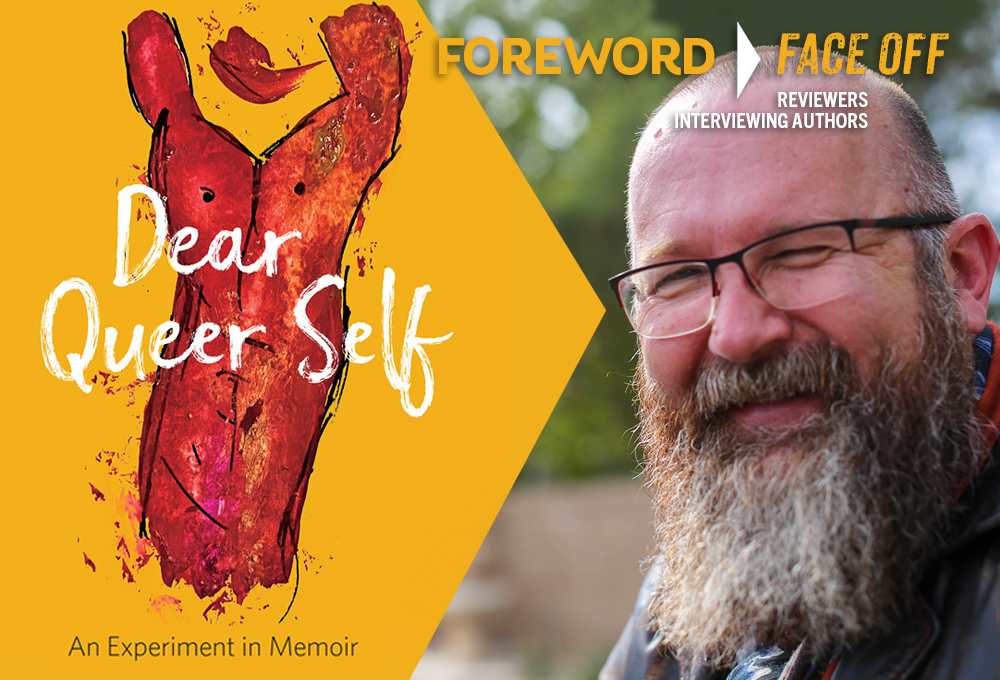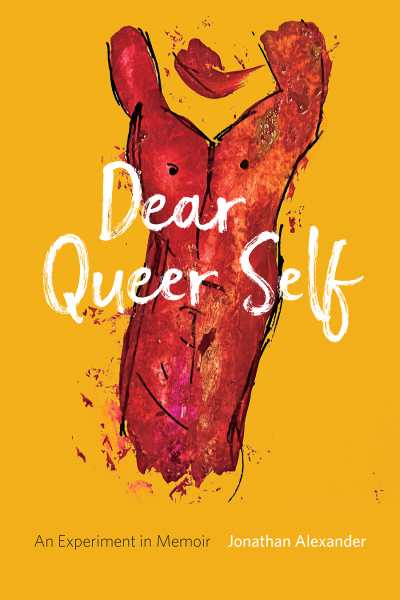Reviewer Rebecca Foster Interviews Jonathan Alexander, Author of Dear Queer Self: An Experiment in Memoir

And the nominee for the Book Title Hall of Fame goes to Dear Queer Self, Jonathan Alexander’s Experiment in Memoir.
Bald. Catchy. A little bit OTT. Challenging to those unnamed who could use a little challenging. We 
found it to be irresistible.
Further turned on by Rebecca Foster’s starred review in Foreword, we tasked her with an interview.
Dear Queer Self forms part of a loose autobiographical trilogy. How do the three books fit together to capture your life thus far?
I didn’t intend to write a trilogy, but after writing Creep: A Life, A Theory, An Apology, I realized I had more to say. That first book, Creep, explores how I grew up thinking of myself as a creep; as a creepy little kid full of unusual, even sick desires. I focused a lot on my early years and how family, friends, church figures, the mass media all shaped my self-understanding as a young queer kid—in very negative ways. But Creep was focused very much on my internal states, on my sense of self. I realized I had more to say, specifically about the larger social, cultural, and even political structures that shaped that creepy sense of self. So I wrote Bullied: The Story of an Abuse, which starts to turn away from my internal sense of self to the larger social structures that supported and spread homophobic thinking.
Finally, I began to realize that writing all of this stuff out was, well, not exactly “healing,” but certainly revelatory, to me at least. I began to think, what would happen if I could tell all of this to my younger self? Would that have helped him better understand what he was going through?
So I wrote Dear Queer Self as a letter to that younger self. In the process, I ended up telling him not so much that it gets better (it doesn’t always), but how much I admired that he survived everything he did!
The subtitle is An Experiment in Memoir. What genre and authority connotations do you hope that has for readers?
I think all memoir writing is an experiment. That is, when we write about our experiences, we are experimenting with different perspectives on what has happened to us. We never capture the fullness of the experience. Writing can’t do that. But we also realize in writing that, even when we were experiencing events, we weren’t really experiencing them in their fullness. Sometimes, through writing, you only realize later what happened to you. And those thoughts on what’s happened to you continue to change over time. You can have very conflicting views throughout your life about ONE incident! Memoir is a writing technology that experiments with those perspectives, revealing them, considering them, debating them, and then reconsidering them yet again.
The second person works perfectly for your book. What drew you to this narrative voice?
Thank you! I have to admit that I was somewhat inspired by Jay McInerney’s Bright Lights, Big City. In thinking about my youth, I was also thinking about the books that I read in the 1980s and 90s, books that inspired me to write. McInerney’s book, his first I believe, was written in the second person, something pretty unusual at the time. It made a big impression on me and seemed a potentially useful stylistic choice for my book as well.
To what extent do you think the experiences you recount are universal, versus determined by your upbringing and the times?
I’m definitely convinced that such experiences are context-bound, particular to times and places. Dear Queer Self references the particular places—New Orleans, southern Colorado, Portland, Oregon—in which it takes place. Experiences are shaped by place. But I do think that the experiences are, if not “relatable,” at least understandable, perhaps “translatable” to other people’s lives. That’s why we read (and write). Not just to see ourselves but to expand our sense of what’s possible, what’s available to be felt and experienced.
It took some guts to include the details of your sex life. What are the risks and potential benefits of such self-exposure?
I love this question! After a certain point, because I’m older I suppose, it feels less risky to write about sex, or the kinds of sexual self-experimentation I describe in Dear Queer Self. If anything, I almost felt it necessary—vital—to write those scenes because we DON’T in our culture talk about sex, especially masturbation, in ways that are open, honest, without shame or a sense of spectacle. And yet, what is more human than to want to know what your body can experience, what sensations you are able to coax out of your flesh? I wanted not just to be honest about such things but, in a way, to be educative as well.
What is the primary emotion you feel towards your younger self these days? Compassion? Embarrassment? Or something else?
Who doesn’t look at their younger self and feel embarrassment AND compassion? If you don’t feel a mixture of both, you’re not looking hard enough at your life! At the same time, I think what I most feel now is pride. And gratitude. I’m grateful to him. He survived. He made me what I am today. And, finally, older now, loving myself, I’m grateful to have had the chance to come to love myself—and him. I wouldn’t have had that chance without him.
Rebecca Foster
